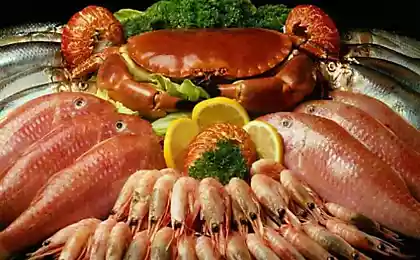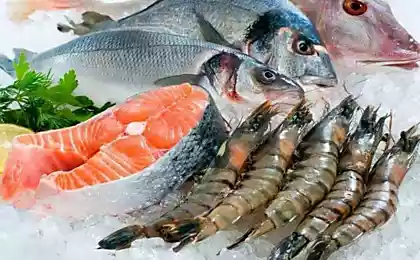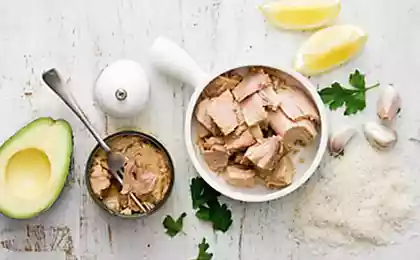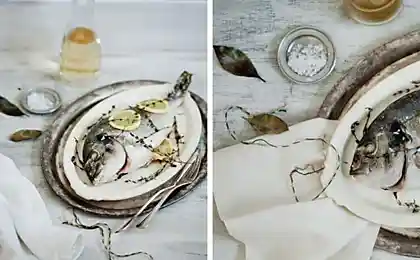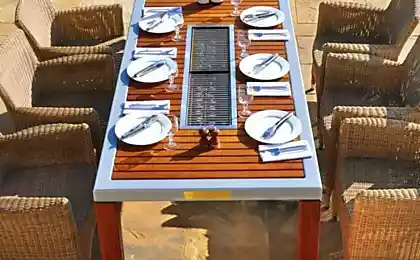498
Remember about us when you eat this fish: Learn the truth about seafood from Your table
Forty one million six hundred fifty thousand six hundred ninety five
Remember about us when you eat this fish
Recalcitrant lock: with many men, producing fish in Indonesia are treated like slaves. "We all want finally to go home," says one of them.
The desperate struggle of slaves engaged in the production of seafood
Work shifts lasting up to 22 hours, ill-treatment, dirty water, cells, work for free: fishmongers and seafood contain secretly on the Islands of Indonesia these slaves.
Slaves from Burma sit on the ground, looking through the rusty bars of his cage — tucked away on a small Indonesian island thousands of miles away from his home. Just a few meters from them other workers charged the court with fish and seafood caught by slaves. The goods will go into the major supermarkets, restaurants and pet stores.
Here, in the village Bendzhina, around and in the waters of the region on the situation of prisoners contained hundreds of people. They witness a vicious regard in the industry of seafood between producers and consumer countries.
Seventy six million eight hundred sixty seven thousand five hundred thirty six
Photo: AP
The fishermen, trapped in a cage.
Many of the prisoners interviewed by the journalists of the news Agency associated Press (AP), from Burma, one of the poorest countries in the world. In Indonesia they came through Thailand. The fish caught by them, goes to the same place, and in Thailand and the world market. AP year was developing themes, interviewing more than 40 current and former slaves, and the trace of movement caught fish.
Some of the fishermen risked their lives, begging reporters for help. "I want to go home. We all want home," one of them shouted from the boat, and his companions in misfortune has repeated this call. "Our parents had not heard about us. I'm sure they think we're dead."
Business absolve themselves of guilt
Large business structures identified by AP in the United States, refused to be interviewed. But in the written explanations they condemned the violation of labor laws. They agreed to cooperate with human rights organizations. But for violations of the responsible subcontractors.
The slaves talk about the shifts of 20-22 hours. They have to drink dirty water, their trampling feet beat or whip tailed stingrays are poisonous, if they complain or make a break in work. Pay little or nothing at all.
Twenty two million three hundred ninety seven thousand five hundred forty nine
Photo: AP
Escaped the fishermen living in the woods around Bencini
The fugitive Hlaing Min talked about the many dead in the sea. "When the Americans and Europeans eat the fish, they should remember us," he says. "Under the surface of the sea hides a mountain of human bones. There are so many that they could form the whole island."
In a small harbour Bencini runs the firm "Pusaka Bendzhina resurses". On site in addition to a five-story office building is located and the cage with the slaves. The company uses over 90 fish trawlers. And no interviews.
"It is difficult to provide a" decently organized chain of delivery
In Bendzhina catch reloaded on the big ship reefer owned by the company "silver sea reef". There I don't know anything about the enslaved fishermen. "We are only engaged in the delivery, which we rent to our customers", — said the head of the company the Company Loanscommon.
AP more than 15 days followed the ship through a satellite service, until it came into the port of Samut Sakhon in Thailand. There is production in for four nights was overloaded to more than 150 trucks and transported to the nearby factory.
From there the processed seafood comes to other businesses in Thailand, and at the end of the chain among other things and American firms, as follows from the data of US customs. Business communication at least partially confirmed from Thailand. To questions about working conditions to answer nobody wants.
Three million eight hundred one thousand three hundred ninety nine
Photo: AP
The President of the Association of Thai frozen products, doctor the track-it hit. Armatron, the exhibition in Boston.
Also "Thai Union manufacturing", subcontractor of the larger Thai firms engaged in seafood, "Thai Union frozen products", dealt with the slaves produced fish. "We all have to admit that it is difficult to ensure 100% purity of the entire delivery chain in Thai fishing industry", — said the head of the "Thai Union" Thiraphong of Chancery in the email.
The corpses next to the fish
After the publication of the first results of the investigation from the AP, the company has made after just one application. It says that immediately terminated the business relationship with the supplier as soon as it was established that he was involved in forced work and other violations. Exactly who was this supplier that has not been told.
Fifty three million one hundred thirty six thousand three hundred eighty eight
Photo: AP
Fish is loaded on the ship that will take her to Thailand.
Enslaved fishermen from Benjina not have a clue about where to go catch fish. They know only that that is too expensive to let them have it. In a neglected cemetery with over 60 graves, many are already overgrown with grass. The names of the buried and the names of ships on wooden tablets often rigged. Only their friends know who's really found their final rest.
Before the guards simply threw the corpses into the sea to be eaten by sharks, says a former slave Chloe, Phi. But then the officials and firms began to demand that each member of a team consisted on the account and must be eventually returned back to earth. Then the captains began to return to Bendzhina to store dead bodies in refrigerators along with the fish.
"I have a feeling that I will forever remain in Indonesia," says PIO, wiping tears from his eyes. "I remember, when digging the grave, I thought that the only thing that we are all waiting for is death".
Editor's note: news Agency Hey-PI had informed the International organization for migration, the stories of these people. On the basis of her the police took them from Bendzhina in a safe place. However, the hundreds of slaves still work in other parts of the island. Last week five of them were in the cage. published
Authors: Margie Maison, Martha Mendoza, Esther Husan
Source: svonb.livejournal.com/881379.html
Remember about us when you eat this fish
Recalcitrant lock: with many men, producing fish in Indonesia are treated like slaves. "We all want finally to go home," says one of them.
The desperate struggle of slaves engaged in the production of seafood
Work shifts lasting up to 22 hours, ill-treatment, dirty water, cells, work for free: fishmongers and seafood contain secretly on the Islands of Indonesia these slaves.
Slaves from Burma sit on the ground, looking through the rusty bars of his cage — tucked away on a small Indonesian island thousands of miles away from his home. Just a few meters from them other workers charged the court with fish and seafood caught by slaves. The goods will go into the major supermarkets, restaurants and pet stores.
Here, in the village Bendzhina, around and in the waters of the region on the situation of prisoners contained hundreds of people. They witness a vicious regard in the industry of seafood between producers and consumer countries.
Seventy six million eight hundred sixty seven thousand five hundred thirty six
Photo: AP
The fishermen, trapped in a cage.
Many of the prisoners interviewed by the journalists of the news Agency associated Press (AP), from Burma, one of the poorest countries in the world. In Indonesia they came through Thailand. The fish caught by them, goes to the same place, and in Thailand and the world market. AP year was developing themes, interviewing more than 40 current and former slaves, and the trace of movement caught fish.
Some of the fishermen risked their lives, begging reporters for help. "I want to go home. We all want home," one of them shouted from the boat, and his companions in misfortune has repeated this call. "Our parents had not heard about us. I'm sure they think we're dead."
Business absolve themselves of guilt
Large business structures identified by AP in the United States, refused to be interviewed. But in the written explanations they condemned the violation of labor laws. They agreed to cooperate with human rights organizations. But for violations of the responsible subcontractors.
The slaves talk about the shifts of 20-22 hours. They have to drink dirty water, their trampling feet beat or whip tailed stingrays are poisonous, if they complain or make a break in work. Pay little or nothing at all.
Twenty two million three hundred ninety seven thousand five hundred forty nine
Photo: AP
Escaped the fishermen living in the woods around Bencini
The fugitive Hlaing Min talked about the many dead in the sea. "When the Americans and Europeans eat the fish, they should remember us," he says. "Under the surface of the sea hides a mountain of human bones. There are so many that they could form the whole island."
In a small harbour Bencini runs the firm "Pusaka Bendzhina resurses". On site in addition to a five-story office building is located and the cage with the slaves. The company uses over 90 fish trawlers. And no interviews.
"It is difficult to provide a" decently organized chain of delivery
In Bendzhina catch reloaded on the big ship reefer owned by the company "silver sea reef". There I don't know anything about the enslaved fishermen. "We are only engaged in the delivery, which we rent to our customers", — said the head of the company the Company Loanscommon.
AP more than 15 days followed the ship through a satellite service, until it came into the port of Samut Sakhon in Thailand. There is production in for four nights was overloaded to more than 150 trucks and transported to the nearby factory.
From there the processed seafood comes to other businesses in Thailand, and at the end of the chain among other things and American firms, as follows from the data of US customs. Business communication at least partially confirmed from Thailand. To questions about working conditions to answer nobody wants.
Three million eight hundred one thousand three hundred ninety nine
Photo: AP
The President of the Association of Thai frozen products, doctor the track-it hit. Armatron, the exhibition in Boston.
Also "Thai Union manufacturing", subcontractor of the larger Thai firms engaged in seafood, "Thai Union frozen products", dealt with the slaves produced fish. "We all have to admit that it is difficult to ensure 100% purity of the entire delivery chain in Thai fishing industry", — said the head of the "Thai Union" Thiraphong of Chancery in the email.
The corpses next to the fish
After the publication of the first results of the investigation from the AP, the company has made after just one application. It says that immediately terminated the business relationship with the supplier as soon as it was established that he was involved in forced work and other violations. Exactly who was this supplier that has not been told.
Fifty three million one hundred thirty six thousand three hundred eighty eight
Photo: AP
Fish is loaded on the ship that will take her to Thailand.
Enslaved fishermen from Benjina not have a clue about where to go catch fish. They know only that that is too expensive to let them have it. In a neglected cemetery with over 60 graves, many are already overgrown with grass. The names of the buried and the names of ships on wooden tablets often rigged. Only their friends know who's really found their final rest.
Before the guards simply threw the corpses into the sea to be eaten by sharks, says a former slave Chloe, Phi. But then the officials and firms began to demand that each member of a team consisted on the account and must be eventually returned back to earth. Then the captains began to return to Bendzhina to store dead bodies in refrigerators along with the fish.
"I have a feeling that I will forever remain in Indonesia," says PIO, wiping tears from his eyes. "I remember, when digging the grave, I thought that the only thing that we are all waiting for is death".
Editor's note: news Agency Hey-PI had informed the International organization for migration, the stories of these people. On the basis of her the police took them from Bendzhina in a safe place. However, the hundreds of slaves still work in other parts of the island. Last week five of them were in the cage. published
Authors: Margie Maison, Martha Mendoza, Esther Husan
Source: svonb.livejournal.com/881379.html


